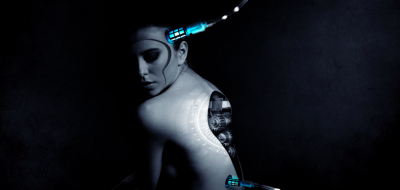Contemporary debates on robotization focus typically on machines that populate workplaces. However, people’s lives are not all work. We need close human contact and emotional interactions with others. All this also concerns the area of eroticism. Are we in for a sexual revolution featuring artificial intelligence?
The famous movie Ex Machina portrays romance blossoming between a man and an artificially engineered beauty. The incredible humanoid character from Alex Garland’s picture fascinates us because, like us, it expresses emotions, asks questions and engages in conversation. On top of this, it moves gracefully and, importantly, is not devoid of a certain sensuality. The story focuses on the fascinating topic of the future relations between humans and machines. Relations that may grow ever more complicated and encompass an ever broader range of emotions, desires and fears.
What can the ideal lover do?
That a machine can appeal to our sexuality is clear not only to movie-makers. A new industry is emerging right before our eyes associated with entertainment and bodily pleasures. Obviously, the use of a machine, a sex robot or a doll as a sexual gadget is nothing new. However, it has only been in the last few years that the makers of adult inventions have begun to wonder about how to improve sex products using the latest technologies. I realize that the idea of a machine in the role of a lover is controversial and may make many readers cringe. I would nevertheless like to acknowledge some aspects of the idea, deliberately ignoring the matter of the spiritual decay of our species. I am not claiming that a vision of a sex robot in our bedrooms offers a particularly attractive way of achieving spiritual and sexual satisfaction. However, I see the field as fraught with issues that strike me as intriguing.
Move like a human
The sex industry faces challenges similar to those which have long occupied the minds of engineers in major research laboratories. Artificial intelligence developers have for years subscribed to the opinion that a true technological breakthrough will be achieved with the arrival of devices capable of mimicking human motion. While algorithms which allow computers to prevail over humans in the games of chess and go have turned out to be achievable, the next big challenge is to build a robot that moves like a human. As it turns out, an insurmountable barrier for contemporary technology is to create a machine whose motor functions are comparable to the movements of a three-year-old. And if the problem remains unsolvable, the thought of creating a perfect sexual partner that replaces a human lover will remain a pipe dream.

Ex Machina (2015)
The touch of sensitive artificial skin
There are a number of other technical limitations that impede the development of advanced sex gadgets. To be perfect at erotic games, the sex robots of the future would have to combine innovations from multiple fields such as nanotechnology, understanding natural language and engineering.
A key role in experiencing erotic pleasure in humans is played by the skin and the sense of touch. This makes today’s research into synthetic skin intriguing. Earlier this year, sciencedaily.com published a story on the achievements of Caltech and ETH Zurich engineers, who have successfully tested synthetic skin capable of sensing a wide range of temperatures. Such skin may be ideal to help people who have suffered limb trauma or even amputations. The temperature sensing mechanism in the machine relies on pectins derived from plant cells. The researchers who discovered the properties of this ingredient created a transparent 20-micrometer-thin film. The film detects temperatures using a mechanism employed by vipers. During their nightly hunts, these snakes can sense the heat of their approaching prey. The new skin can sense temperature changes within the range of 5 to 50 degrees Celsius. Pectin-based systems may have industrial applications, such as for instance temperature sensors or skin used for increased interaction among … robots! In the latter case, artificial skin would trigger a response to the approach of another machine. The mechanism could easily be used for potential sexual interactions between robots and humans.
Sexual paradise
The web abounds with scenarios for sex of the future. Many of them are surprisingly positive. A good example are the predictions of Laura Brendan, who shared her reflections on sex with the readers of The Wall Street Journal. Her article “The Future of Sex: It Gets Better” may be considered to be a manifesto of optimism and joy with respect to the sex of the future. Her conclusions are clearly positive. The author claims that it is only now, with new technologies, that we will be able to experience true sexual joy. We are leaving behind the times when the only way to gain sexual stimulation other than from other humans was to resort to pornographic content. Technological breakthroughs mean that sight is no longer the only sense engaged in providing pleasure in such a context. According to Laura Brendan, advances in the neurobiology of sex will lead to a new ability to stimulate the brain to experience sexual pleasure regardless of physical contact. “Imagine engaging in anything from targeted foreplay to exploring your wildest fantasies by stimulating your partner with a click of the mouse, even when you are across town or in another country”, writes Brendan. For many of us, this vision is neither persuasive nor attractive, due to the psychological barrier it contains which we find difficult to overcome. However, disabled people may have a whole different view of the matter. The sex lives of members of that social group are being increasingly discussed. Much publicity has been given in the media to a recent debate on a project implemented in Sweden and the Czech Republic, employing sex therapists to help people who are immobile or physically dysfunctional and therefore unable to enjoy sex. It is not a big stretch to imagine that precisely such people are the ones to benefit from the technology-based sexual revolution. I would imagine, for instance, that sex with a close one who cannot visit us physically as he or she is for whatever reason unable to move, may be a joyous experience, even if special software is used for the purpose.

Android Piri from movie Blade Runner (1982)
The chilly gaze of a machine
Personally, I believe the limits of the entire sphere lie in communications. While, undeniably, the presence of digital assistants capable of actively responding to our questions (Siri) will be ever more present in our lives, it is nevertheless hard to image virtual software (or a machine) that allows our bodies to detect sexual stimuli and receive the full spectrum of verbal and non-verbal signals that come with closeness. At an intimate moment, as we gaze into our partner’s eyes, we see his/her emotions, devotion, feelings and love. All those things that form an integral part of profound sexual contact. I don’t think we will ever live to see the dilating pupils of the machine we invite into our bedroom.
On the other hand, I agree that such sex would be completely safe. I realize also that for many of us, eroticism is a world of diverse fantasies and needs, which may actually mean that the involvement of artificial intelligence in this field will be both interesting and surprising. There are many big changes ahead of us.

Killer robots in Austin Powers: International Man of Mystery (1997)
Related articles:
– Will a basic income guarantee be necessary when machines take our jobs?
– How I love to get scared in movie theatres – my favourite Artificial Intelligence films
– Only God can count that fast – the world of quantum computing
– Machine Learning. Computers coming of age
– End of the world we know, welcome to the digital reality










Oniwaban
AI is nothing what people make it out to be. It doesn’t have self-awareness, nor can it outgrow a human. Up until this day there has never been a program demonstrated that can grow & develop on its own. AI is simply a pattern, or a set of human made instructions that tell the computer how to gather & parse data. GPT-3 (OpenAI) works very similar to a Google search engine. It takes a phrase from one person, performs a search on billions of website articles and books to find a matching dialog, then adjusts everything to make it fit grammatically. So in reality this is just like performing a search on a search, on a search, on a search, and so on….
TommyG
The robot would act ‘as if’ it loved you, but it would not love you any more than a rock would love you. Is this moral? Should such devices be banned?
Personally, I think not, as long as we understand exactly what we are getting into bed with. People already get into bed with animated yet lifeless artefacts. There are artefacts on the market that enable people to experience orgasms. Are machine generated orgasms as good as the real human deal? Who is to judge? Opinions differ.
I do not see a persuasive case for banning sex toys, whether they are manually or remotely piloted or even embodied and autonomous. However, there is a case for a health warning to ensure people know about unidirectional emotional bonding. Robots may be able to perform sex acts today but it may be decades or centuries before they can return your love.The Conversation
Oscar2
Hmm, think harder about it. The nr. 1 reason why men go to sex doll brothels in countries where they already exist is to do the stuff they can’t do to a real woman. There are reports of dismembered, cut, burned, brutalized dolls already.
Depending on the man there’s also the risk of men not being able to have sex with real women anymore as they get used to plastic dolls with perfect features and no flaws on their body. Or the risk of them not being able to control their urges for violent sex. Both of these situations already happen because of porn and knowing men, it will definitely happen with sex dolls too.
So in the end, sex dolls as a substitution for prostitutes wouldn’t be an ethical option because it would bring huge consequences for women.
And99rew
In essence, porn and now sex dolls are training men into behaving like my ex-boyfriend did. He was “born that way” (genetically inclined), I believe, and came from a highly patriarchal household (absent, critical father, doting, emotionally incestuous mother in love with her oldest son), so he was also trained that way by patriarchy; but the way he turned out–as a disturbed sexual predator–is disturbing to most of us but makes him a hero to PUAs, incels, MRAs, fellow rapists and rape apologist men all around. These men are proliferating because of this spreading modern attitude; there are four basic types of rapist–power, anger, sadistic, and obsessive–and that last one is actually acknowledged to be pornography-caused or encouraged (men who obsessively force women, usually their partners or dates, to do oral or anal, or sometimes more fetish-y things, because of sex acts they have seen in porn), which it even mentions on the Wikipedia entry for types of rapist (why it’s so mind-boggling we continue to deny that porn causes rape, it’s just that it’s date, partner or acquaintance rape so it goes unreported most of the time); by giving highly realistic, totally submissive facsimiles of women to men to penetrate in every orifice, with no wants, needs, desires, or (most importantly for avoiding rape) boundaries of their own, we are literally training these men to be sexual narcissists and the “obsessive” type rapists who will get pissed off their human girlfriend won’t give them anal or blow jobs on demand.
Adam Spikey
Have you used chatbots in companies to coach leaders or for behavioural learning ?
TomaszK1
Great insight. I think AI will be a major industry one day, but you pointed out exactly why not yet. AI is not doing anything that’s “better, faster, or cheaper” yet.
The true usefulness of AI will come when it can solve complex, multi-step user queries, faster than any app can. Right now most machines can only do basic one or two step tasks that can be done faster by an app.
Adam Spikey
Speed and reasons for why AI has progressed clarified 🙂 Sometimes you need to understand the past a little to more clearly see how thing will go in the future.
Adam Spikey
This one is pure fun 🙂
Norbert Biedrzycki
That was the reason for this piece – to have some fun while writing
And99rew
What does any of that have to do with “jealousy” (the same lamebrained accusation hurled at women who don’t put up with porn-using husbands or boyfriends, either)? But they are so narcissistic they literally can’t imagine it’s not about jealousy but rather about our sadness over their lost humanity and the fact that they’re now going to foist their dead-eyed woman-hatred on us for the rest of our lives.
TomK
IBM Just Broke The Record of Simulating Chemistry With a Quantum Computer
Last year, Google engineers simulated the bonding of a pair of hydrogen atoms on its own quantum computer, demonstrating a proof of principle in the complex modelling of the simplest arrangement of energies in molecules.
Molecular simulations aren’t revolutionary on their own – classical computers are capable of some pretty detailed models that can involve far more than three atoms.
But even our biggest supercomputers can quickly struggle with the exponential nature of keeping track of quantum interactions of each new electron involved in a molecule’s bonds, something which is a walk in the park for a quantum computer.
https://futurism.com/ibm-just-broke-the-record-of-simulating-chemistry-with-a-quantum-computer/
Simon GEE
Great movie examples.
Re article I would say that the most interesting ethical dilemmas specifically concern robotization. The questions are analogous to those asked with regard to autonomous vehicles. Today’s robots are only learning to walk, answer questions, hold a beverage bottle, open a fridge and run. Some are more natural than others at these tasks. Robots will not only replace us in many jobs. They can really be helpful, in e.g. taking care of the elderly, where constant daily assistance is required.